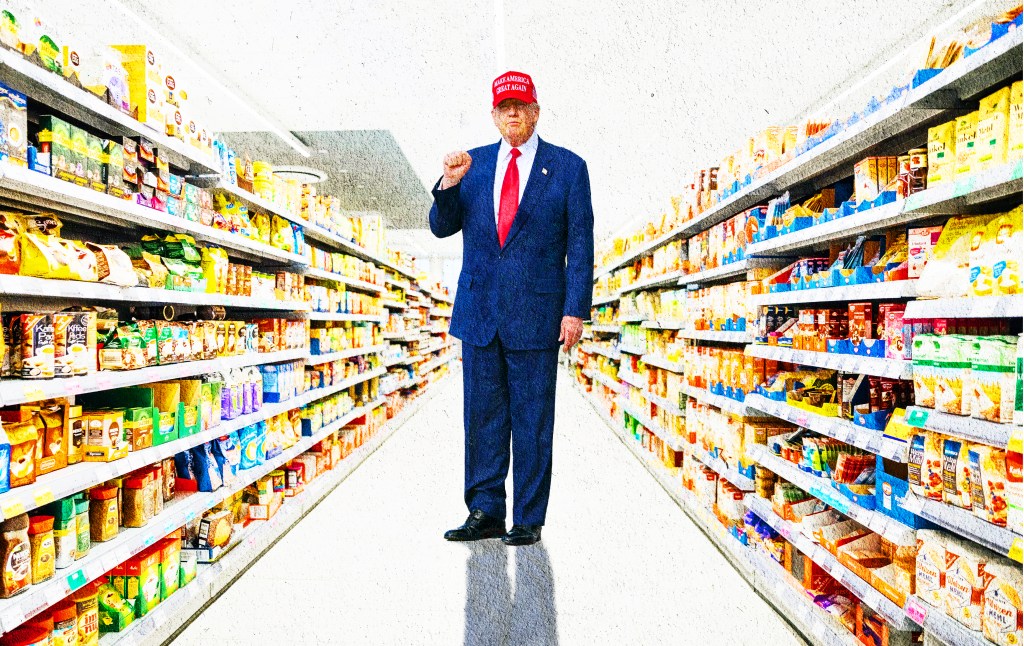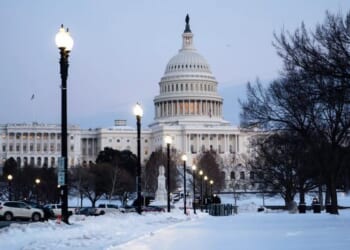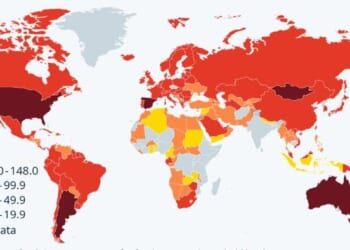
Devil’s bargain.
One of the rare joys of social media is getting to watch Very Online political influencers cope in real time when they’re dealt a resounding electoral defeat.
They’re more clerics than pundits, spending their days preaching about the inerrancy of their creed, the damnation of heretics, and the assurance of good’s ultimate victory over evil. So when reality intrudes with news that might shake the congregation’s faith, watching them scramble to explain it away feels more like a religious crisis than a political one.
It happened last night as the magnitude of the left’s victory became clear. Some postliberals postulated that voters resented the president for spending too much time supporting Israel. Others blamed infighting: If only normie Republicans had stopped trying to purge the GOP of Nazis, you see, the right might have come together to defeat the real enemy—the Jay Jones Gestapo.
Maintaining clout as an influencer means never asking your faction to reflect on its sins or question its political assumptions. And so it came as a surprise when Vivek Ramaswamy, of all people, invited right-wing populists to reflect on their sins and question their political assumptions.
Republicans need to fix two things, the frontrunner to become Ohio’s next governor claimed last night as results rolled in. First, “cut out the identity politics,” he said. “We don’t care about the color of your skin or your religion. We care about the content of your character.” I don’t know who he means by “we”—as Ramaswamy is regularly reminded, lots of right-wingers do care about the color of his skin and his religion—but the sentiment is virtuous, if unconvincing.
His other piece of advice was more persuasive. “Our side needs to focus on affordability,” he declared. “Make the American dream affordable. Bring down costs—electric costs, grocery costs, health-care costs, and housing costs.”
It’s strange to see Ramaswamy, who ran for president last year as a more-Trump-than-Trump culture warrior, pivot sharply to economic populism, but affordability is indeed the common thread in Democrats’ victories in Virginia, New Jersey, and New York City on Tuesday. It’s the issue on which Spanberger, Sherrill, and Mamdani all ran and which propelled socialism to one of the biggest victories it’s ever had in America.
Which brings us to the Grand Unified Theory of why Democrats romped: Simply put, Trump has welshed on the devil’s bargain he offered last fall. Give me a free hand to govern as I like, without accountability, the president implied, and I’ll bring back the economic glory days of 2019, starting with restoring the pre-pandemic cost of living. It was a bribe of sorts, and voters accepted.
But Trump hasn’t paid up. Americans traded their civic birthright for a mess of pottage, it turns out. The economic glory days have not returned.
Not only does inflation remain inflated, but the president’s grossly unpopular tariff policy has driven up the cost of manufacturing inputs and added needless strain to the affordability crisis. Monday’s newsletter, which sifted through the data on growing disillusionment with his economy, ended with these words: “We were given the choice last year between more expensive meat and fascism. We chose fascism, and now we will have more expensive meat. People won’t suffer that lightly.”
On Tuesday night, they didn’t. QED.
Bait and switch?
But it’s worse than that. The larger point of Monday’s column was that, too often, Trump hasn’t even seemed to care about the cost of living.
He was clear-eyed last December about how much affordability mattered to his victory. “I’m looking to get—bring prices down,” he told Meet the Press, “because, you know, I won on two things. … I won on the border, and I won on groceries.” That’s right, and he’s addressed the first of those two issues energetically (and then some). But the second? A few days ago, he dismissed a question about tariffs by claiming “we don’t have inflation,” the sort of delusional answer that would have provoked calls to put Joe Biden in a home had he said something similar.
Instead of “groceries,” most of the non-immigration energy in Trump’s second term has gone into authoritarian power grabs, corporate shakedowns, dubiously legal troop deployments, and vindictive persecution of political enemies. Even after last night, I maintain that most Americans are corrupt enough to tolerate being governed by an autocracy if it delivers on its promises of prosperity. But when it doesn’t, when the president is plainly more interested in ballrooms and tariffs and bombing fishing boats in the Caribbean than in making beef cheaper, the average Joe will feel like he’s been suckered.
It would go too far to call the president’s shifting priorities a bait-and-switch—he (and I) warned Americans many times during the campaign of the abuses to come—but it will seem like one to voters who didn’t expect his priorities to skew so heavily towards consolidating power. Even the issue that he’s delivered on contains a sense of bait-and-switch, in fact: Despite some supporters’ complaints that he’s been too ruthless in enforcing immigration law against non-criminal illegal immigrants, the president insists that his administration hasn’t been ruthless enough. Hispanics, among others, have noticed.
Savor the irony of Tuesday’s wipeout, then. Democrats lost in 2024 because voters believed they’d become too consumed with fringy ideological hobby horses and too disengaged from kitchen-table issues—and Republicans lost in 2025 for the same reason. Go figure that Ramaswamy, a candidate for statewide office next year, would be quicker to recognize that and to adjust than the average MAGA armchair culture warrior is.
And while it’s always uncomfortable giving Chuck Schumer and Hakeem Jeffries credit for political acumen, it must be said that their current shutdown ploy now looks savvier than it did a month ago. Democrats desperately needed a way to rebrand as a party that takes the cost of living seriously; pulling a risky political stunt in the name of making health insurance more affordable for Obamacare customers may have achieved that. There’s no conclusion to be drawn from last night’s outcome other than that, at worst, the shutdown did them no harm and, at best, it helped lift them to victory. And Trump agrees.
They want to be the “groceries” party, and the president, very stupidly, has given them an opening.
Doubling down.
So it’s official. Trump is now a lame duck, and Republicans should start running away from him to protect themselves from voters’ disgruntlement over the devil’s bargain they struck last year. Right?
Well, no. Arguably the opposite.
It’s a truism in 2025 that the party of Trump tends not to do well at the polls when Trump himself isn’t running. (2021, the first post-pandemic election, was an exception.) In 2018, the first midterm election after he took office, the GOP got crushed in House races. In 2022, with the president preparing a political comeback, the expected red wave fizzled and the party barely reclaimed the House. Last night, a Trump-less Republican ballot disappointed again, producing the worst electoral rout for the right in the MAGA era.
Chalk it up to celebrity, charisma, attitude, or whatever you like, but there’s plainly a large share of Trump voters who will show up to vote for him but not for other Republicans. And the president knows it. “‘TRUMP WASN’T ON THE BALLOT, AND SHUTDOWN, WERE THE TWO REASONS THAT REPUBLICANS LOST ELECTIONS TONIGHT,’ according to Pollsters,” he bleated on Truth Social as the severity of Tuesday night’s beating became clear.
He wasn’t on the ballot and, legally, can never be on a presidential ballot again. It seems obvious that if the GOP wants to motivate his fans to turn out for off-year races, it needs to find ways to get around that and put him back on the ballot—at least symbolically.
A midterm convention is one way to do that.
News broke in August that Democrats are thinking of holding one next year to goose enthusiasm for November’s congressional elections, but that doesn’t make much sense to me. Normally, the opposition benefits from turning the midterm election into a referendum on the president. Holding a convention would amount to reframing the campaign instead as a choice between Democrats’ vision for America and that of Republicans—and voters do not think much of the former.
Sure, it would give liberals a chance to hammer the “affordability” message again on a big stage, but their candidates will spend the summer and fall doing that anyway. Besides, the hard truth is that the Democratic Party lacks charismatic political talent right now that might meaningfully galvanize swing voters. Is a televised Josh Shapiro speech really going to move votes? Would the party benefit or suffer nationally from showcasing Gavin Newsom or far-left Alexandria Ocasio-Cortez?
Republicans are also considering a convention, though, which seems like a better idea to me. It would defy the received wisdom that unpopular presidents should lie low before the midterms so as not to remind Americans of why they hate him and his party, but that wisdom seems silly as applied to Trump.
To begin with, it’s goofy to worry that a convention might “remind” voters of why they dislike a figure as domineering and ubiquitous as Trump is. We live, momentarily, in a soft autocracy, and in an autocracy, overexposure of the autocrat is sort of the point. No one who votes Democratic next fall to rebuke authoritarianism will require the extra motivation that might come from hate-watching a Trump-led convention.
But those who show up to vote Republican only when Trump is on the ballot might conceivably be moved by a primetime appeal from their hero to turn out in November. I can’t rule as a king if Democrats take back the House, the president would warn his supporters. Bribes, threats, extortion—all the stuff you love is at risk if we lose Congress. That might juice right-wing enthusiasm even in a rough economy. He can’t put himself on the ballot to get MAGA voters excited, but he can at least put his legacy on it.
Trump forever.
Jonathan Last is right that Tuesday’s debacle will inject new seriousness into the “Trump 2028” scenario and various other Republican authoritarian schemes to upend the next two national elections.
For instance, the president is sure to turn more aggressive about subverting the midterms by interfering in swing districts now that the likelihood of a blue wave has risen. Having already tried to put a thumb on the electoral scale via ruthless but legal means, he’ll conclude that the growing probability of a Democratic wave requires more desperate measures.
But even that won’t solve the knotty problem of not having him on the ballot in a party that rarely wins if he’s not on the ballot. Only a more determined effort to sidestep the 22nd Amendment can address that—so I suspect that’s what we’re going to get, and not just from the most moon-eyed MAGA diehards. The only thing the apparatchiks in this garbage party care about is power; if they become convinced that their power depends on conniving to keep Trump in office, that’s what many of them will do. Tuesday night’s thumping may have gone a long way to convince them.
If nothing else, the election results will persuade the president and his admirers that he must remain the face of the right for as long as possible. Admittedly, he doesn’t need much persuading. “Trump will not permit any Republican to openly position themselves to run in 2028,” Last wrote, “because the minute he allows that, he ceases to be the main character in Republican politics. For both psychological and financial reasons, this is not something he can allow.” Right—and now for electoral reasons too. The GOP can’t win if it moves on from me, so it must not move on.
So don’t be surprised if the president stops chattering about the prospect of a Vance-Rubio ticket in 2028, as he’s occasionally prone to do. As embarrassing as Tuesday’s blue wave was for him, it probably also deposited him in a happy place by reassuring him that the Republican Party isn’t viable without him. The fate of the American right, and therefore America, and therefore the world, depends upon him remaining in charge. He can never leave.

















